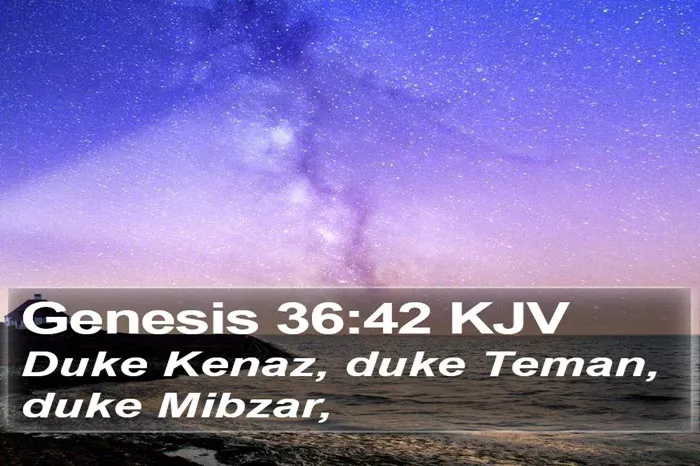Read the Daily Bible Verse – Genesis 36:42 To Strengthen Your Spiritual Journey.
Genesis 36:42, while a brief verse, carries significant implications within the broader narrative of Genesis and the history of the people of Israel. This article aims to explore the context, meaning, applications, comparisons with other biblical texts, and its relevance in modern life.
The Context of Genesis 36:42 (KJV)
Genesis 36 details the lineage and descendants of Esau, who is also known as Edom. This chapter serves to clarify the familial and national identities that arise from Esau, contrasting them with the lineage of Jacob, who became Israel.
Historical Background
The historical backdrop of Genesis 36 is essential for understanding the dynamics between the descendants of Esau and Jacob. Esau, the elder twin brother of Jacob, sold his birthright for a meal, which established a contentious relationship between the two families. Over time, this tension evolved into a national divide, with the Edomites, descendants of Esau, often in conflict with the Israelites, descendants of Jacob.
Structure of Genesis 36
The chapter is structured around genealogies, listing the sons and grandsons of Esau and detailing their settlements. The verse in question, Genesis 36:42, reads:
“And Duke Magdiel, and Duke Iram: these are the dukes of Edom, according to their dwellings in the land of their possession: he is Esau the father of the Edomites.” (KJV)
This verse is part of a longer genealogical account that aims to illustrate the growth and establishment of Esau’s descendants.
The Genesis 36:42 Meaning
Genealogical Significance
Genesis 36:42 encapsulates the essence of genealogical importance in the biblical narrative. The mention of “dukes” signifies leadership and the formation of a structured society among Esau’s descendants. Each duke represents a clan or family head, indicating the development of a complex social hierarchy within Edom.
Esau as the Father of Edom
Referring to Esau as “the father of the Edomites” reinforces his role as a patriarch. This statement not only marks the beginning of the Edomite nation but also serves to remind the readers of the ongoing significance of the Edomites in relation to the Israelites.
Theological Implications
From a theological perspective, this verse reinforces God‘s sovereignty over nations and individuals. Despite Esau’s initial rejection of his birthright, God still allows for the flourishing of his descendants. This serves as a reminder that God’s plans often extend beyond human failings and conflicts.
Genesis 36:42 Application in Life
Understanding Family Legacies
Genesis 36:42 invites reflection on the importance of family legacies. In today’s society, family backgrounds can shape identity and influence future generations. This verse encourages individuals to honor their family histories while recognizing the potential for growth and change.
The Value of Leadership
The reference to dukes highlights the importance of leadership within communities. In contemporary life, this can be seen as a call for responsible leadership that values heritage and encourages community development. Whether in families, workplaces, or churches, the qualities of effective leaders—such as integrity, service, and wisdom—are timeless.
The Dynamics of Conflict
The historical tension between the Edomites and Israelites can serve as a lesson in conflict resolution. Understanding the roots of conflict—like those seen in the stories of Esau and Jacob—can guide individuals in their interactions, promoting reconciliation and understanding in modern relationships.
Comparison with Other Biblical Texts
The Birthright and Blessing Narrative
To fully grasp the implications of Genesis 36:42, it is helpful to compare it with earlier narratives about Esau, particularly Genesis 25:29-34 and Genesis 27. The account of Esau selling his birthright and later being deceived out of his blessing by Jacob frames the context for his descendants. The tension between these brothers is echoed in their offspring, illustrating how familial strife can have long-lasting effects.
The Role of Edom in Scripture
Edom appears in various texts throughout the Bible, often in a negative light. For example, in Obadiah, the prophet condemns Edom for its actions against Israel during a time of distress. This ongoing narrative illustrates how the legacy of Esau shaped the national character of Edom and influenced its relationship with Israel.
Modern-Day Relevance
Cultural Identity and Heritage
In today’s multicultural society, understanding one’s heritage is crucial. Genesis 36:42 highlights the importance of acknowledging and valuing cultural backgrounds, fostering a sense of belonging while also recognizing diversity.
Leadership Lessons for Today
The reference to dukes in Genesis 36:42 provides insight into the qualities necessary for effective leadership today. As communities face various challenges, leaders who prioritize unity, wisdom, and service will be essential in guiding people towards common goals.
Conflict and Reconciliation
The historical context of Genesis 36 invites reflection on contemporary issues of conflict. In an era marked by division and strife, the narrative encourages individuals and nations to seek reconciliation, drawing on the lessons learned from the biblical account of Esau and Jacob.
Conclusion
Genesis 36:42, while a seemingly simple verse, is rich with meaning and significance. It encapsulates the complex relationships between Esau’s descendants and Israel, highlights the importance of leadership and family legacy, and offers insights into conflict resolution. The relevance of this verse extends beyond its historical context, providing valuable lessons for modern readers seeking to navigate their identities and relationships in a diverse world.
Genesis 36:42 Commentary
In summary, the commentary on Genesis 36:42 reveals a multi-layered understanding of genealogies in the Bible. This verse serves not only as a record of lineage but also as a reminder of God’s overarching plan for humanity. It encourages readers to reflect on their own legacies, the dynamics of leadership, and the importance of reconciliation in their lives.
Through the lens of Genesis 36:42, we are invited to appreciate the rich tapestry of human relationships and the divine purpose that weaves through them, reminding us that, regardless of our backgrounds, we are all part of a larger story that God is telling.
Related topics:
- What does Genesis 36:41 Mean?
- Genesis 36:40 Meaning, Context & Commentary
- What does Genesis 36:39 Mean?

